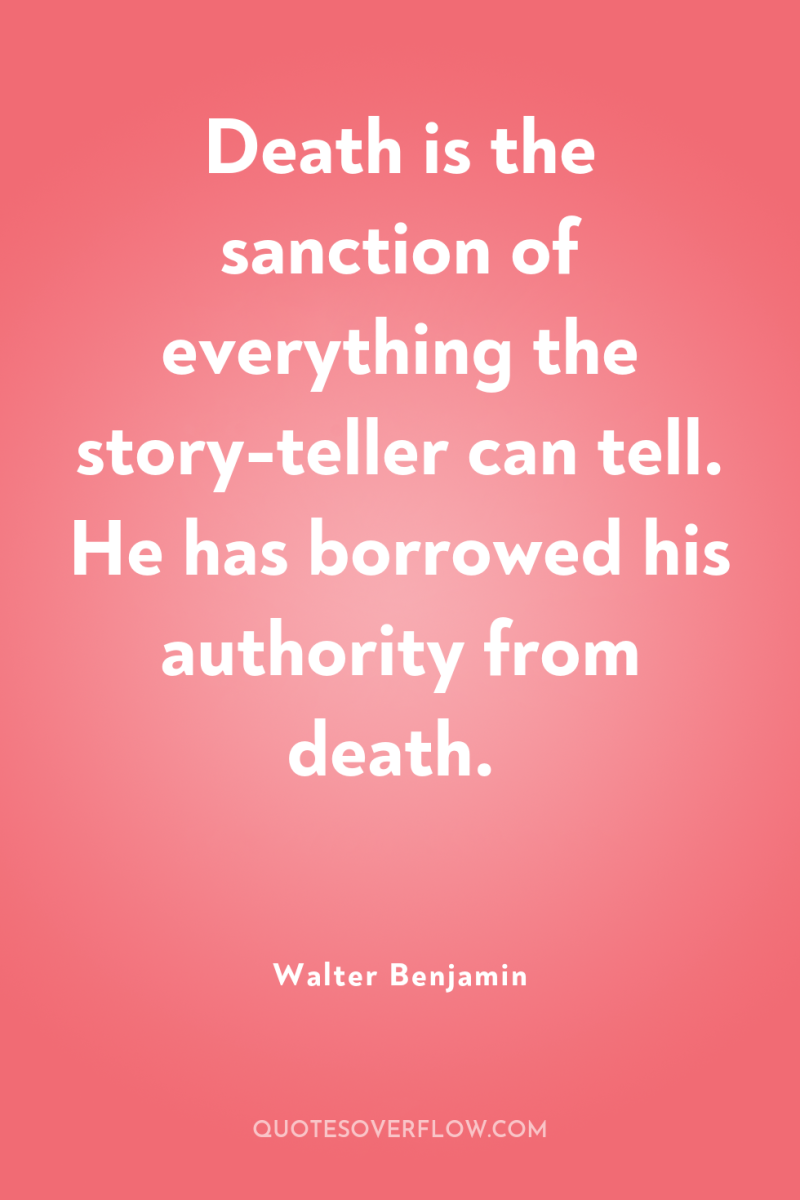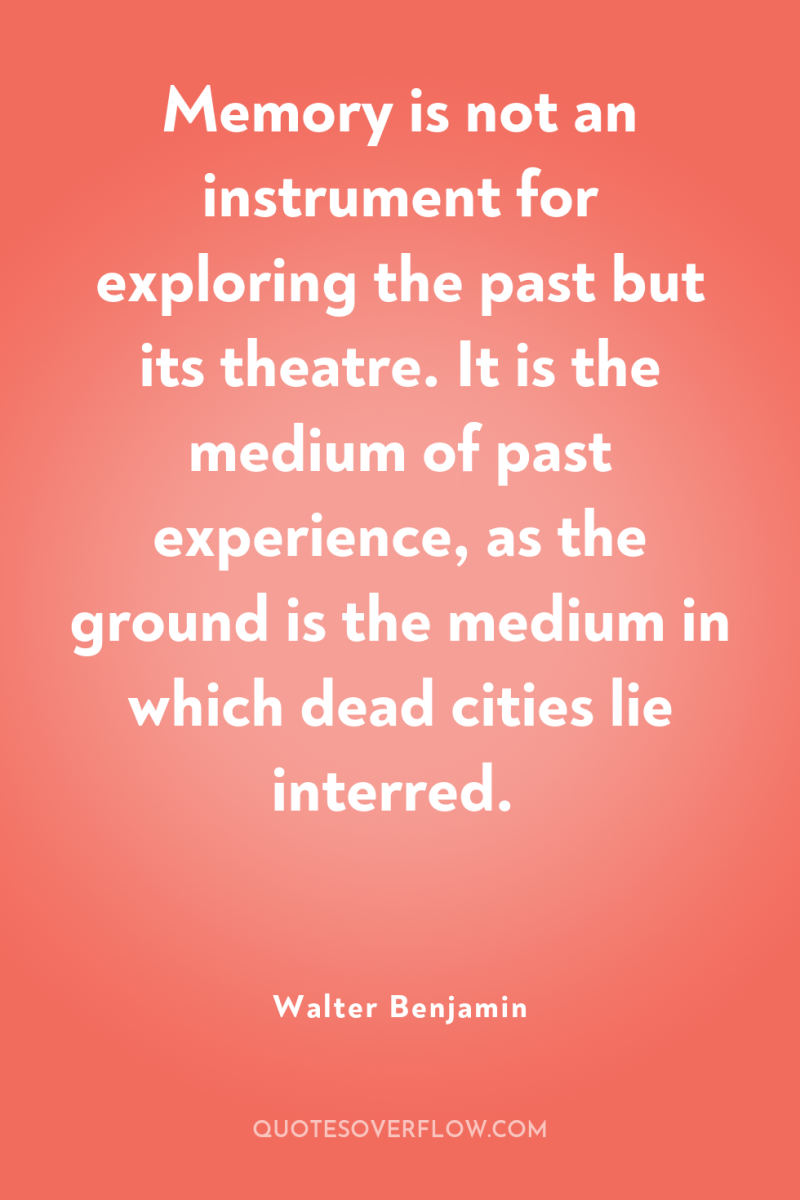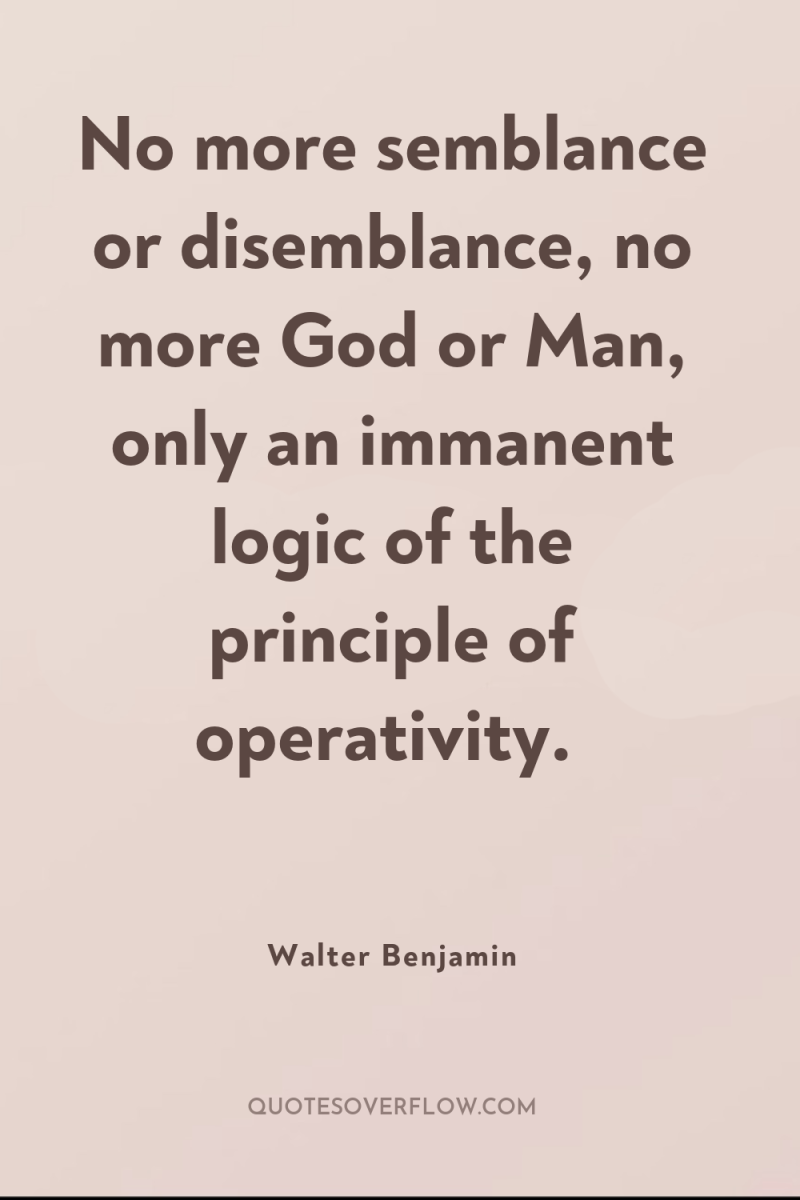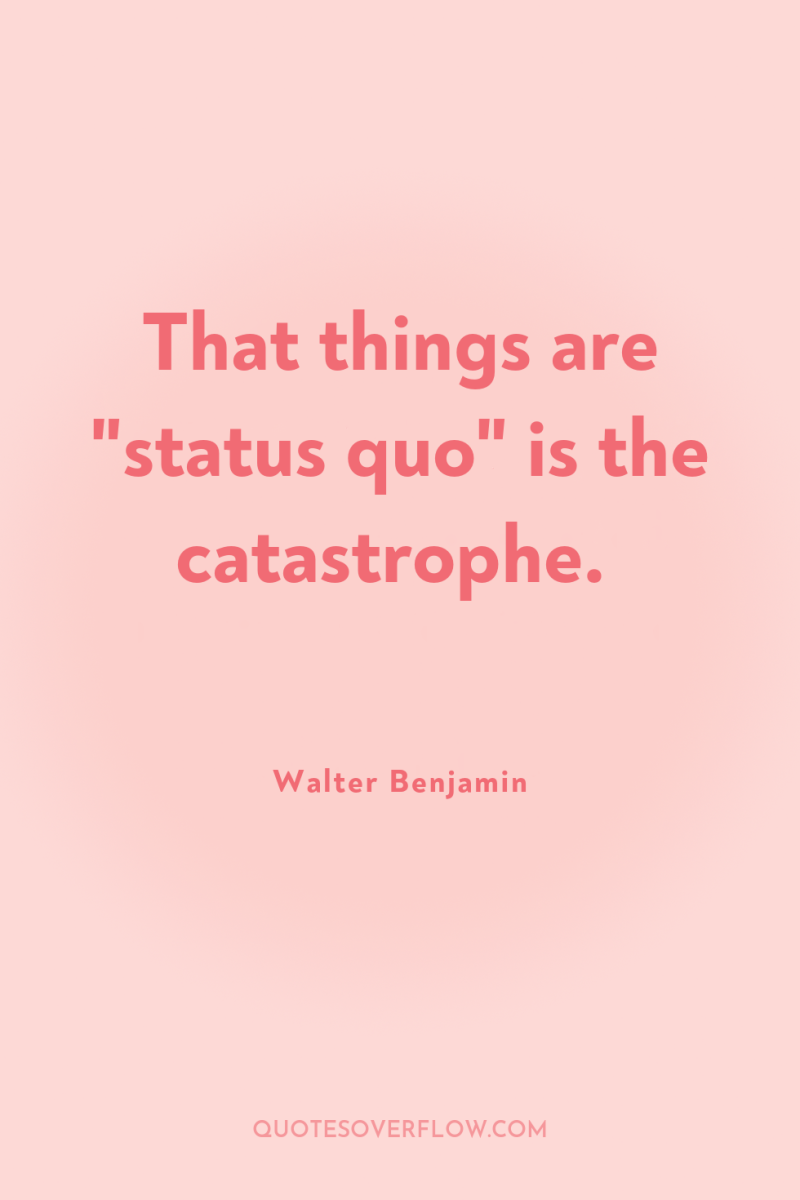
The only way of knowing a person is to love them without hope.Walter Benjamin

Every passion borders on the chaotic, but the collector's passion borders on the chaos of memories.Walter Benjamin
Truth resists being projected into the realm of knowledge.Walter Benjamin

Death is the sanction of everything the story-teller can tell. He has borrowed his authority from death.Walter Benjamin

Writers are really people who write books not because they are poor, but because they are dissatisfied with the books which they could buy but do not like.Walter Benjamin

The work of memory collapses time.Walter Benjamin

Memory is not an instrument for exploring the past but its theatre. It is the medium of past experience, as the ground is the medium in which dead cities lie interred.Walter Benjamin

No more semblance or disemblance, no more God or Man, only an immanent logic of the principle of operativity.Walter Benjamin

How many cities have revealed themselves to me in the marches I undertook in the pursuit of books!Walter Benjamin

Genuine polemics approach a book as lovingly as a cannibal spices a baby.Walter Benjamin

All efforts to make politics aesthetic culminate in one thing, war.Walter Benjamin

That things are "status quo" is the catastrophe.Walter Benjamin
The expressions of those moving about a picture gallery show ill-concealed disappointment that they only find pictures there.Walter Benjamin
History is written by the victors.Walter Benjamin
There is no document of civilization that is not also a document of barbarism.Walter Benjamin
Memory is not an instrument for surveying the past but its theater. It is the medium of past experience, just as the earth is the medium in which dead cities lie buried. He who seeks to approach his own buried past must conduct himself like a man digging.Walter Benjamin
What matters for the dialectician is having the wind of world history in his sails. Thinking for him means: to set the sails. It is the way they are set that matters. Words are his sails. The way they are set turns them into concepts.Walter Benjamin
The only historian capable of fanning the spark of hope in the past is the one who is firmly convinced that even the dead will not be safe from the enemy if he is victorious.Walter Benjamin
The tradition of the oppressed teaches us that the “emergency situation” in which we live is the rule. We must arrive at a concept of history which corresponds to this. Then it will become clear that the task before us is the introduction of a real state of emergency; and our position in the struggle against Fascism will thereby improve. Not the least reason that the latter has a chance is that its opponents, in the name of progress, greet it as a historical norm. — The astonishment that the things we are experiencing in the 20th century are “still” possible is by no means philosophical. It is not the beginning of knowledge, unless it would be the knowledge that the conception of history on which it rests is untenable.Walter Benjamin
Every line we succeed in publishing today - no matter how uncertain the future to which we entrust it - is a victory wrenched from the powers of darkness.Walter Benjamin
The important thing for the remembering author is not what he experienced, but the weaving of his memory, the Penelope work of recollection. Or should one call it, rather, the Penelope work of forgetting? .. And is not his work of spontaneous recollection, in which remembrance is the woof and forgetting the warp, a counterpart to Penelope's work rather than its likeness? For here the day unravels what the night has woven. When we awake each morning, we hold in our hands, usually weakly and loosely, but a few fringes of the tapestry of a lived life, as loomed for us by forgetting. However, with our purposeful activity and, even more, our purposive remembering each day unravels the web and the ornaments of forgetting.Walter Benjamin
What has been forgotten.... is never something purely individual.Walter Benjamin
To articulate what is past does not mean to recognize “how it really was.” It means to take control of a memory, as it flashes in a moment of danger.Walter Benjamin
As long as there is still one beggar around, there will still be myth.Walter Benjamin
Boredom is the dream bird that hatches the egg of experience. A rustling in the leaves drives him away.Walter Benjamin
Languages are not strangers to on another.Walter Benjamin
O bliss of the collector, bliss of the man of leisure! Of no one has less been expected and no one has had a greater sense of well-being than... a collector. Ownership is the most intimate relationship one can have to objects. No t that they come alive in him; it is he who comes alive in them.Walter Benjamin
Solitude appeared to me as the only fit state of man.Walter Benjamin
Every morning brings us news of the globe, and yet we are poor in noteworthy stories. This is because no event comes to us without being already shot through with explanation. In other words, by now almost nothing that happens benefits storytelling; almost everything benefits information. Actually, it is half the art of storytelling to keep a story free from explanation as one reproduces it. . The most extraordinary things, marvelous things, are related with the greatest accuracy, but the psychological connection of the event is not forced on the reader. It is left up to him to interpret things the way he understands them, and thus the narrative achieves an amplitude that information lacks. .Walter Benjamin
This process of assimilation, which takes place in depth, requires a state of relaxation that is becoming rarer and rarer. If sleep is the apogee of physical relaxation, boredom is the apogee of mental relaxation. Boredom is the dream bird that hatches the egg of experience. A rustling in the leaves drives him away. His nesting places - the activities that are intimately associated with boredom - are already extinct in the cities and are declining in the country as well. With this the gift for listening is lost and the community of listeners disappears. For storytelling is always the art of repeated stories, and this art is lost when the stories are no longer retained. .Walter Benjamin
Historical materialism has every reason to distinguish itself sharply from bourgeois habits of thought. Its founding concept is not progress but actualization.Walter Benjamin
Any order is a balancing act of extreme precariousness.Walter Benjamin
Work on a good piece of writing proceeds on three levels: a musical one, where it is composed; an architectural one, where it is constructed; and finally, a textile one, where it is woven.Walter Benjamin
And the non-reading of books, you will object, should be characteristic of all collectors? This is news to me, you may say. It is not news at all. experts will bear me out when I say that it is the oldest thing in the world. Suffice it to quote the answer which Anatole France gave to a philistine who admired his library and then finished with the standard question, “And you have read all these books, Monsieur France?” “Not one-tenth of them. I don’t suppose you use your Sevres china every day? .Walter Benjamin
The film is the first art form capable of demonstrating how matter plays tricks on man.Walter Benjamin
The fairy tale, which to this day is the first tutor of children because it was once the first tutor of mankind, secretly lives on in the story. The first true storyteller is, and will continue to be, the teller of fairy tales. Whenever good counsel was at a premium, the fairy tale had it, and where the need was greatest, its aid was nearest. This need was created by myth. The fairy tale tells us of the earliest arrangements that mankind made to shake off the nightmare which myth had placed upon its chest.Walter Benjamin
Painting, by its nature, cannot provide an object of simultaneous collective reception.. as film is able to do today.. And while efforts have been made to present paintings to the masses in galleries and salons, this mode of reception gives the masses no means of organizing and regulating their response. Thus, the same public which reacts progressively to a slapstick comedy inevitably displays a backward attitude toward Surrealism. .Walter Benjamin
Work on good prose has three steps: a musical stage when it is composed, an architectonic one when it is built, and a textile one when it is woven.Walter Benjamin
It is precisely the purpose of the public opinion generated by the press to make the public incapable of judging, to insinuate into it the attitude of someone irresponsible, uninformed.Walter Benjamin
The idea that happiness could have a share in beauty would be too much of a good thing.Walter Benjamin
All human knowledge takes the form of interpretation.Walter Benjamin
The art of storytelling is reaching its end because the epic side of truth, wisdom, is dying out.Walter Benjamin
The greater the decrease in the social significance of an art form, the sharper the distinction between criticism and enjoyment by the public. The conventional is uncritically enjoyed, and the truly new is criticized with aversion.Walter Benjamin
Counsel woven into the fabric of real life is wisdom.Walter Benjamin